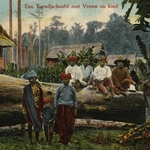Creating Central Sulawesi. Mission Intervention, Colonialism and ‘Multiculturality’
DOI:
https://doi.org/10.18352/bmgn-lchr.7308Keywords:
Colonial politics, IdentityAbstract
Creating Central Sulawesi: Mission Intervention, Colonialism and ‘Multiculturality’Central Sulawesi provides an example of how, under colonialism, non-state bodies contributed to the creation of new political identities in the Indonesian archipelago, and how the modern Indonesian state came to be based on these. Arguably, at the beginning of the twentieth century, the region was poised to be incorporated into the structure of one or other of the existing powerful Central and Southern Sulawesi political entities. As such, as just another ‘region’ in the sprawling archipelagic colony subjected to standard colonial policy, it should have been readily incorporated into the Indonesian state, albeit through the ‘Sulawesi Permesta’. Instead, in seeking to establish what one writer has described as a ‘volkskerk’ [people’s church], the ‘Poso mission’ established with colonial support by the Nederlandsche Zendinggenootschap [Netherlands Missionary Society] in 1892, was instrumental in defining new religious, cultural and linguistic boundaries. These acted to effectively isolate the Pamona people from adjacent Christian communities established by other missionary endeavours; from their Islamic neighbours and, arguably, from the ‘nation’. As elsewhere in the archipelago, the subsequent process of this region’s reintegration has formed part of the difficult postcolonial legacy inherited by the Indonesian nation.
Downloads

Downloads
Published
Issue
Section
License
Authors who publish with this journal agree to the following terms:
a) Authors retain copyright and grant the journal right of first publication with the work simultaneously licensed under a Creative Commons Attribution 4.0 International (CC BY 4.0) that allows others to share the work with an acknowledgement of the work's authorship and initial publication in this journal.
b) Authors are able to enter into separate, additional contractual arrangements for the non-exclusive distribution of the journal's published version of the work (e.g., post it to an institutional repository or publish it in a book), with an acknowledgement of its initial publication in this journal.
c) Authors are permitted to post their work online (e.g., in institutional repositories or on their website) prior to and during the submission process.
Authors are explicitly encouraged to deposit their published article in their institutional repository.











